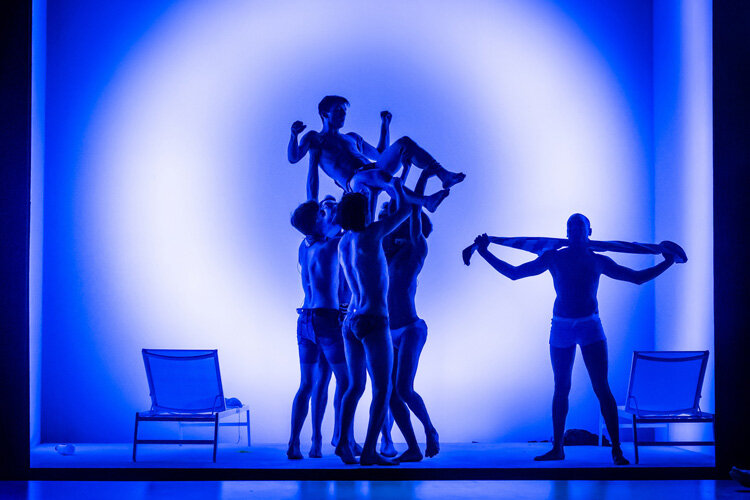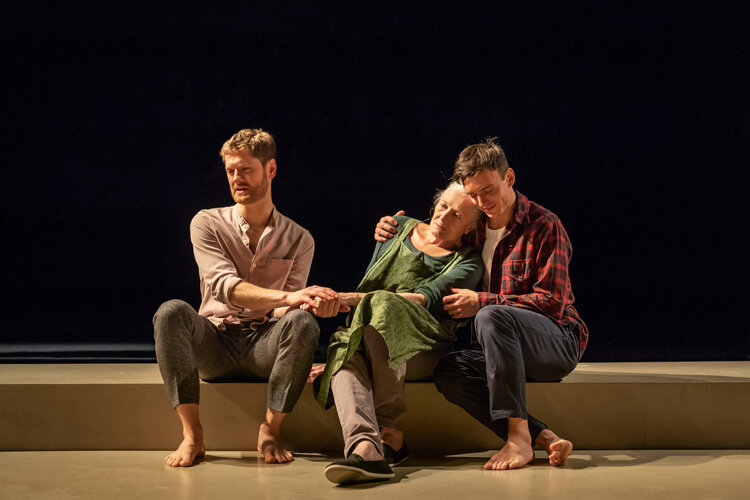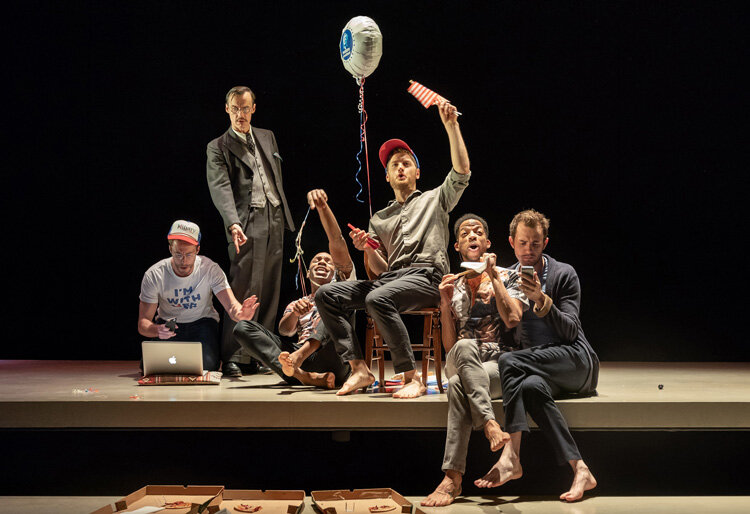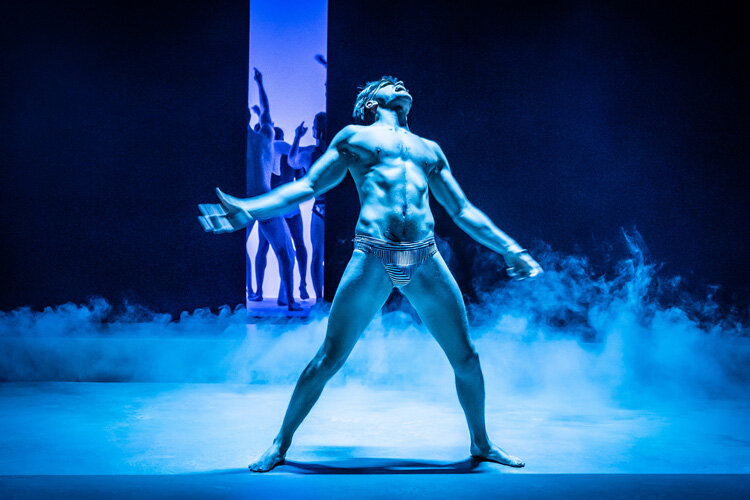The Inheritance
Noel Coward Theatre, London - 13 Oct 2018 - 19 Jan 2019
Mart Crowley’s sixties play The Boys In The Band was a landmark theatrical event that brought unapologetic gay lead characters to the mainstream stage for the first time. It premiered in 1968, the year between the partial decriminalisation of homosexuality in the UK and the Stonewall riots in America. Fast forward twenty three years and Tony Kushner picks up the baton to premiere his play Angels in America in 1991, taking us back to New York and the lives of a new group of gay characters, albeit this time to tell the brutal story of an epidemic that indiscriminately ravaged through the community of a whole generation during the eighties and nineties. With these two productions painting a vivid picture of gay life before and during the AIDS epidemic, twenty eight years later seems about right to be taken back to New York once again, where The Inheritance presents a modern day group of young gay men telling their story in an America on the cusp of a Donald Trump presidency.
The origins of this play aren’t so much a conscious decision to continue the theatrical legacy left by The Boys In The Band and Angels In America however as it is in fact inspired by playwright Matthew Lopez’s chance encounter with the work of EM Forster at a young age, which he now attributes to having changed his life. It’s a presence that is felt strongly in this production, both in it’s themes as well as the appearance of Forster as bookish mentor Morgan (played brilliantly by Paul Hilton like a latter day Magnus Pike… younger readers might need to google that reference), a character who’s presence is strongly felt throughout the first half of this epic seven+ hour two part play, reaching through the decades to speak to a group of young writers, much as Forster’s own work had originally spoken to Lopez himself, eventually leading him to write this tale of love, loss and betrayal.
Whilst contracting HIV no longer carries with it the almost certain death sentence that was the stark reality back in the eighties, The Inheritance nonetheless offers a reflection on the devastating impact the years of ignorance, misinformation and governmental denial had on the thousands of lives that were lost, robbing us, as the play solemnly reminds us, of a whole generation of “poets, mentors, friends and lovers”. This almost forty year history is brilliantly contextualised for the audiences millennials, too young to remember the devastation the gay community was left to deal with in those early years. This is a new era however, and there are new problems for this generation to face including, but not confined to the impending Trump Presidency. Gay culture itself has found itself going from the closet to the mainstream in the intervening years, leaving one character to muse on “The gay community being stripped for parts and hollowed out… our safe spaces being replaced by Grindr’.
Comparisons with Angels In America were always going to be likely given the subject matter and the grand scale in which the story is told, but whilst the last London production of that play had been as memorable for it’s audacious staging as it was for it’s story and performances, designer Bob Crowley has chosen to avoid anything remotely as complex for The Inheritance, opting instead for a mostly baron stage except for a low rise articulated plinth, almost as big as the stage itself and resembling a Japanese style table around which many of the thirteen strong cast sit on cushions for large portions of the play, themselves watching each others drama unfold in the centre. That’s not to say that the play lacks visual impact, it being left instead to the the characters unfolding stories which, under Stephen Daldry’s exemplary direction, are left to fill in the colour on an otherwise mostly monochromatic stage, using what does occur in terms of the set design to maximise the impact of the moment. It’s sparsity seems a bold decision given the plays running time, but in this case it pays off beautifully, allowing the exceptional performances of this outstanding British/American cast to shine in a way that a more complex set may well have distracted from. It also allows Daldry a plain canvas on which to create everything from awe inspiring grand set pieces to moments of the smallest and most intimate detail, all designed to create their own reaction from the audience, whether that be one of laughter or of tears.
It is around the main object of this large table that a group of young writers, encouraged by Forster, begin to write the story of the compassionate, good hearted Eric Glass (Kyle Soller) and his egotistical, self-destructive partner Toby Darling (Andrew Burnap). As the characters story begins to include the presence of an increasing circle of friends, the young writers begin to flesh things out by undertaking the roles of the characters themselves. This allows for several convention busting opportunities as each character finds their circumstances can be quickly changed by the interjection of the other writers in their ongoing telling of the story, suggestions that are sometimes objected to by the character themselves, into who the young writers seem to be increasingly morphing as the play progresses. This is wonderfully wall-breaking stuff that takes us between the drama played out as if in reality, and the occasional discourse by the young writers out of character on the merits of their decisions, taken in order to drive the story forward. The lines become increasingly blurred and, add on top of this a couple of wonderful opportunities to take things beyond the fourth wall, as well as beyond reality (as in one of the more imaginative sex scenes you are ever likely to witness on stage) and the play has no problem in effortlessly engaging the audience throughout.
The script is beautifully punctuated by some moving monologues and sharp one-liners,”It feels like the world is falling apart”, says Eric. “The world’s been falling apart since it started”, is the response he gets from the older, but not always wiser Henry (John Benjamin Hickey). It is the interaction between the various age groups that for me is one of the plays real secret weapons, through the discussions that this dynamic fosters. “I can’t imagine what those years were like”, Eric says to his older neighbour Walter, allowing him to respond by verbally painting an incredibly moving portrait, leaving neither Eric or the audience in any doubt about the reality of what it was like to be living as a gay man through the darkest days of AIDS. There are, needless to say, several increasingly dark moments peppered throughout, but as the play itself muses, “If we can’t have a conversation with our past, what will become of our future”, herein revealing one of the plays central themes. Whether this is intended just as a reminder or more as a wake up call is largely dependent on the audience’s personal reaction to it.
The titular theme of Inheritance comes in many shapes and forms, it being questionable if this play would have even existed had it not been for the legacy passed down by the other ground breaking productions that came before it. It definitely wouldn’t have existed had Lopez not been so transfixed by the work of Forster, and so becomes his own personal Inheritance. In the play itself a hustler called Leo’s Inheritance it is the strain of HIV that has been passed from person to person before finally reaching him (a breathtaking performance by Samuel H. Levine), and for Eric Glass it is the house left to him by his elderly friend Walter, a property with a meaning that goes far beyond the bricks and mortar it has been constructed with. It is to this house that the action is taken for the last act, and it is when Venessa Redgrave finally takes to the stage as Margaret, a neighbour who has been looking after the properties upkeep and provides another of the plays moving intergenerational discourses.
I am not sure time has ever passed by so fast, or my emotions left more frayed than they were by the end of this outstanding piece of memorable and moving theatre. The emotional roller coaster ride is far more likely to leave you drained by the end of The Inheritance than the duration of this perfectly paced play.
★★★★★








